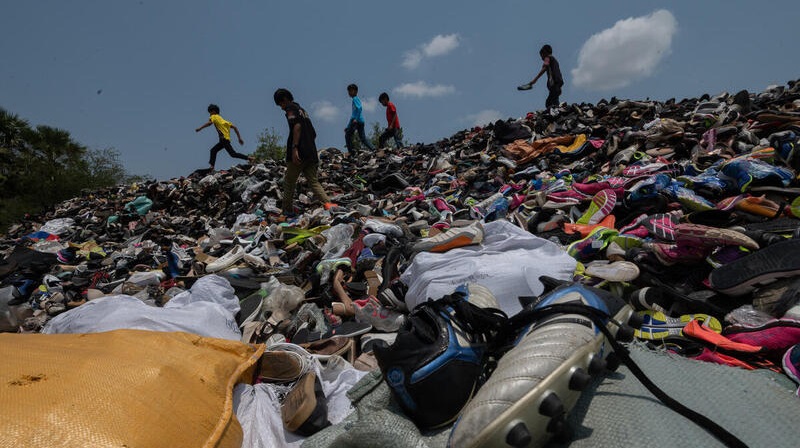Negotiators and observers say it’s unlikely that a strong plastics deal will be done this year
The European Union (EU) has warned that other governments’ “delaying tactics” will make it “very difficult” to agree a new global treaty to tackle plastic pollution by the end of this year, as planned.
The head of the European Commission’s environment department, Virginijus Sinkevičius, said on Tuesday that the last round of plastics talks in the Canadian city of Ottawa in April had managed to “move the text forward despite delaying tactics by countries wanting to lower the ambition”.
Yet, he told environment ministers from EU member states, “at the current pace… it will be very difficult to close the negotiations at INC5 in November”. INC5 is the fifth and supposedly final set of talks on the treaty, taking place in the South Korean city of Busan from November 25 to December 1.
A Latin American plastics negotiator, who did not want to be named, told Climate Home that everything Sinkevičius had said was right and the delaying tactics were coming from the Like-Minded Group, which includes Russia and Saudi Arabia.
Sign up to get our weekly newsletter straight to your inbox, plus breaking news, investigations and extra bulletins from key events
Bethanie Carney Almroth, an ecotoxicology professor at the University of Gothenburg who follows the talks, said there were “enormous challenges to closing the negotiations in November”. Campaigner Andrés Del Castillo, with the Centre for International Environmental Law (CIEL), added that Busan would either result in a “very, very weak agreement, or a realisation on Sunday evening that we did not succeed”.
Plastic production divisive
At the UN Environment Assembly in March 2022, all governments agreed to set up a treaty by the end of 2024. The talks’ organisers still hope agreement can be reached in Busan and the treaty can be officially signed by governments at a diplomatic conference a few months later.
One key divisive issue is whether the treaty should be limited to halting plastic pollution or also set targets to reduce the rising plastic production and consumption that is causing the problem. Besides environmental contamination, plastic contributes to planet-heating emissions as its manufacture relies on fossil fuels.
At the Ottawa talks, governments did not agree to continue formal discussions on how to cut plastic production. But informal talks have since taken place between countries in favour of reducing production, and there will be a formal meeting of an expert group in August.
Sinkevičius warned yesterday that “these expert meetings may not be enough to secure a successful end of negotiations” this year. “We need to step up effort at all levels, including high level political involvement” before and during the Busan talks, he added.
Lithium tug of war: the US-China rivalry for Argentina’s white gold
Speaking after Sinkevičius, French diplomat Cyril Piquemal was more optimistic, saying”significant progress” had been made in Ottawa. He noted that the G7 group of wealthy economies committed last week to reducing production of plastic and that China made a similar commitment earlier this month. “We are really on the home run,” he said through a translator.
Researcher Almroth said she was concerned that, if Donald Trump were to be elected president of the US, then it could weaken the ambition of treaty negotiations if they spill over into 2025. “A lot of people want to finish [this year],” she said, adding that “a start and strengthen approach will likely be very useful”.
But Dennis Clare, who negotiates for the Pacific Island state of Micronesia, said “it is much more important that the plastics treaty solves the overarching problem than that it is concluded by any particular date”.
“If essential elements such as constraints on plastics production are not included,” he said, “the magnitude of that mistake will only become more glaring by the day, as the health, climate and litter crises accelerate worldwide – and we will of course have to immediately get back to work to remedy the situation”.
Ana Lê Rocha, plastics lead at the GAIA campaign, agreed that the pact should not be rushed. “If we need to choose between maintaining ambition on the content of the treaty versus maintaining ambition on the timeline, it is preferable to compromise on the timeline than to have a treaty unable to meet its goal: to end plastic pollution,” she argued.
CIEL’s Del Castillo agreed, but said just prolonging the talks was unlikely to result in success. “So what we [would] need is the recognition that we need more time and a re
Read More

